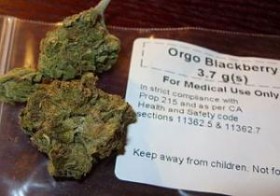Illinois became the latest state to allow for the medical use of marijuana Thursday, when Gov. Pat Quinn (D) signed into law House Bill 1, the Compassionate Use of Medical Cannabis Act. It now joins 20 other states and the District of Columbia.
 “As Nelson Mandela once said, ‘Our human compassion binds us the one to the other — not in pity or patronizingly, but as human beings who have learnt how to turn our common suffering into hope for the future’,” Gov. Quinn said in a Thursday press release. “Over the years, I’ve been moved by the brave patients and veterans who are fighting terrible illnesses. They need and deserve pain relief. This new law will provide that relief and help eligible patients ease their suffering, while making sure Illinois has the nation’s strictest safeguards to prevent abuse.”
“As Nelson Mandela once said, ‘Our human compassion binds us the one to the other — not in pity or patronizingly, but as human beings who have learnt how to turn our common suffering into hope for the future’,” Gov. Quinn said in a Thursday press release. “Over the years, I’ve been moved by the brave patients and veterans who are fighting terrible illnesses. They need and deserve pain relief. This new law will provide that relief and help eligible patients ease their suffering, while making sure Illinois has the nation’s strictest safeguards to prevent abuse.”
Sponsored by Rep. Lou Lang (D-Skokie) and Sen. William Haine (D-Alton), the bill is tightly written and highly restrictive. Patients and caregivers will not be allowed to grow their own; instead they must rely on a system of 22 cultivation centers, which will be subject to 24-hour surveillance and inventory control, and no more than 60 licensed dispensaries statewide. Patients will be able to purchase up to 2 ½ ounces of medical marijuana every two weeks.
The law specifies 35 medical conditions for eligibility, such as muscular dystrophy, cancer, multiple sclerosis and HIV/AIDS. The prescribing physician and patient must have an established relationship. Minors and people with felony drug convictions or psychiatric conditions do not qualify. Patients may not be police officers, firefighters, probation officers or school bus drivers. Patients who drive while impaired by medical cannabis face the same penalties as those who drive while impaired by prescription drugs.
Under the law, medical marijuana use is barred in schools, prisons, homes used for childcare, or any public place. Landlords may refuse to allow marijuana smoking on leased properties, and employers will still be able to fire patients who test positive for marijuana.
Medical marijuana will be taxed at the same 1% rate as pharmaceutical drugs, but grow centers and dispensaries will also pay a 7% “privilege tax,” which will go to paying administrative costs for the program. Unlike just about any other economic sector, dispensaries and cultivation centers are barred from contributing to political campaigns.
“Pain and suffering for many chronically ill and terminally ill individuals will be significantly lessened, if not eliminated in some cases, because of Governor Pat Quinn’s courage to sign a controversial bill that often has been subjected to distortions and fear mongering,” said Rep. Lang, a Deputy Majority Leader in the Illinois House. “On behalf of the many patients who came to Springfield to advocate for the bill, I want to thank the governor.”
“Patients afflicted by the most unbearable conditions finally have a compassionate answer to their cries for help,” said Sen. Bill Haine (D-Alton), a former prosecutor. “This program alleviates suffering and provides strong safeguards against abuse. We are ensuring only those suffering from the most serious diseases receive this treatment.”
Supporters of HB 1 included the Illinois Nurses Association, Protestants for the Common Good, Illinois State Bar Association, AIDS Foundation of Chicago, United Food and Commercial Workers, ACLU of Illinois, AFL-CIO, Community Renewal Society, Illinois Eye Center, 270 physicians from across the state and many others. Deserving of special mention is the Marijuana Policy Project, which has spent a decade making Illinois the first Midwest state to approve medical marijuana through the legislative process.
Article republished from Stop the Drug War under Creative Commons Licensing









